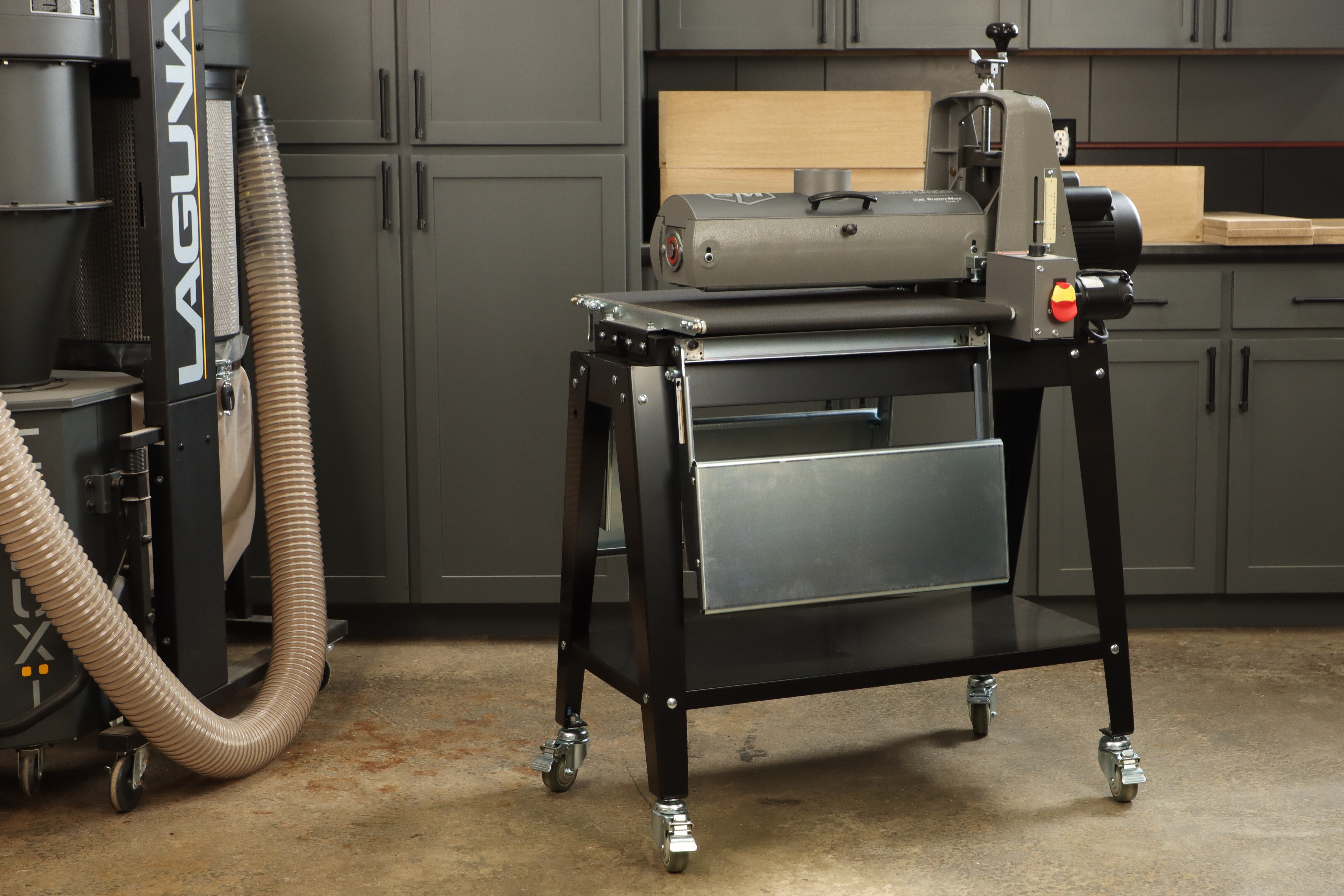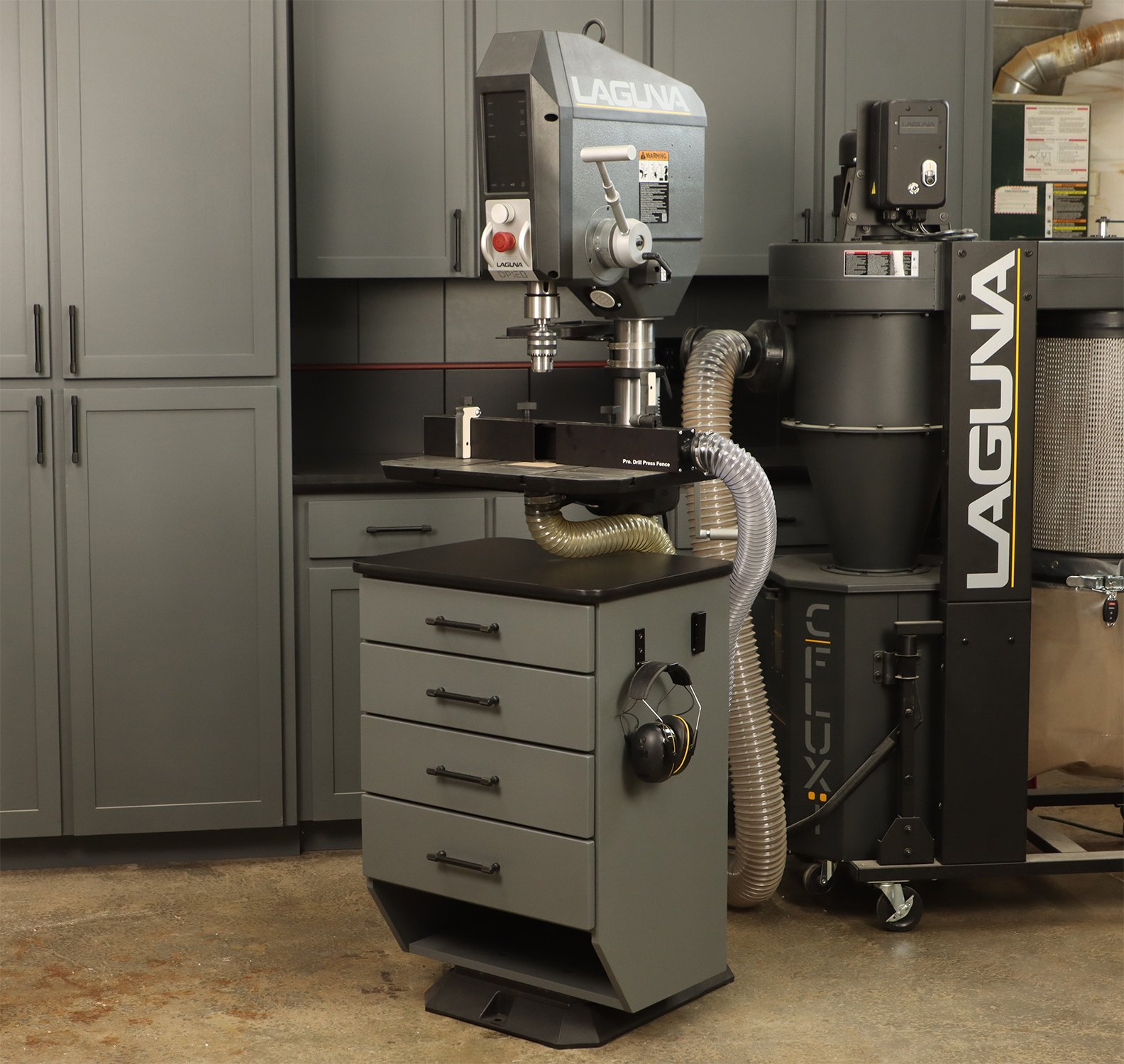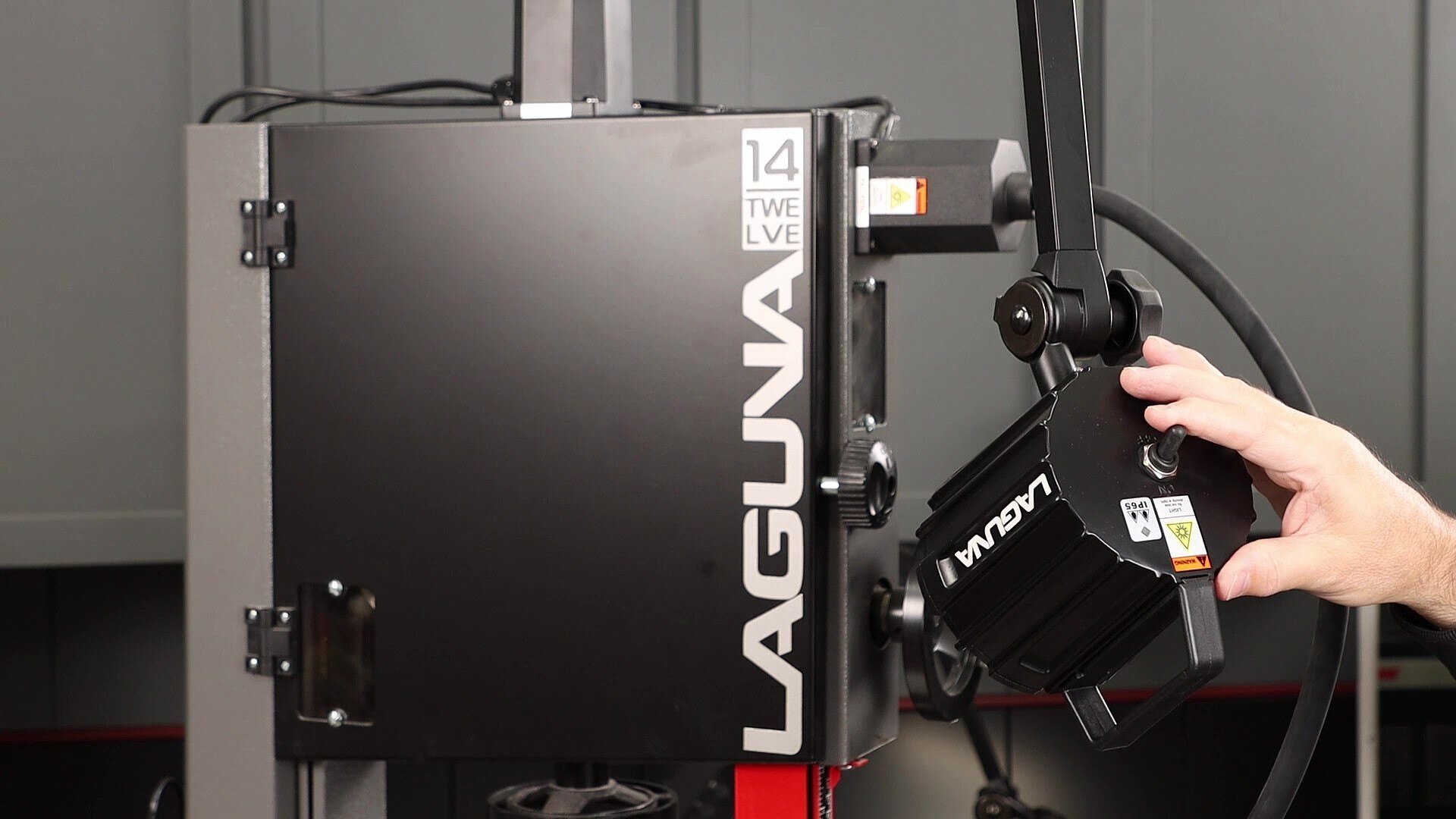What kind of production quotas are you looking to meet at your woodshop? Whether you’re running a small family business or churning out cabinetry en masse, industrial woodworking machinery has a place in your shop.
Knowing which machinery you need is half the battle. The most common industrial woodworking machines include:
-
Dust collectors
-
Bandsaws
-
Jointers
-
Edgebanders
-
Panelsaws
-
Planers
-
Shapers
-
Superbrushes
-
Tablesaws
-
Widebelt sanders
Each one of these machines is a valuable asset in the right shop. Dust collectors can keep your employees working safely with clean air, while widebelt sanders can process the biggest jobs to a polish—in minutes!
Here’s what you need to know about each one:
Dust Collectors

If you’ve ever set foot into your own woodshop, you know that dust is everywhere after a single cutting job… let alone hundreds of jobs back to back all day long.
The right dust collector can improve your air quality and make your workspace safer. Using a dust collector can reduce the health hazards associated with wood dust, including:
-
Cancer
-
Dermatitis
-
Respiratory problems
A dust collector pulls air through a series of filters, where it catches wood dust and other debris. It sounds simple, but it’s a crucial part of running a safe woodshop.
Look for features like:
-
More surface area for better airflow
-
Positive pressure chambers to pull air through the filters
-
Pneumatically-controlled waste bins for simple dust collection
-
Shaking mechanism to release caked-on dust and prevent impaction

Pictured: E | Flux Series Fume Extractor
Woodshops aren’t the only shops that need a dust collector. Shops that process metal should have a specialized dust collector called a fume extractor.
These extractors filter out the chemicals and metal byproducts that your shop produces en masse every day.
Additionally, a dust collector can help you stay up to OSHA standards and avoid fines.
Occupational Safety and Health Administration (OSHA) enforces Combustible Dust Standards. Following those standards means minimizing dust hazards in your workshop. The simplest way to do it is with a dust collector.
Bandsaws

What can you get done with the right bandsaw? The possibilities are endless depending on the specific machine that you buy.
With the right bandsaw, you can:
-
Saw thick lumber into curves
-
Rip, resaw, and crosscut lumber during processing
-
Cut complex shapes
Sawmills and woodshops both rely heavily on bandsaws. Bandsaws have plenty of versatility, with features that include:
-
Spacious table for processing larger stock
-
Up to a 45° angle table adjustment to remove corners from stock
-
Adjustable fence for resawing a larger variety of stock sizes

Pictured: HRS-28 Horizontal Band Resaw
One of the biggest factors is a sturdy cabinet. When you’re processing large stock, bandsaws tend to vibrate significantly.
This can cause damage to the machine over time and it can affect processing quality too. A heavy cabinet that bolts to the floor is the best choice when shopping for an industrial bandsaw.
Jointers

Jointers create a flat edge on boards so that you can join them together smoothly. The result is a single long plank that’s made from multiple boards.
Two parallel tables support a board as it’s pulled across a cutter head. The infeed table is lower than the outfeed table, which lets the cutter head make contact with the board.
As you feed the board toward the outfeed table, the cutter head processes the edge to a smooth finish.

Pictured: How a jointer works via Struthious Bandersnatch
Any shop that produces jointed planks should have an industrial jointer. Home jointers typically have a cut width that stops at 6 inches or 150 mm, limiting the size boards that you can process.
That’s not enough to process a wide variety of jobs. An industrial jointer can have a capacity of up to 16 inches or 400 mm.

Pictured: Industrial Series 16” Jointer
When you’re shopping for a jointer, look for features like:
-
High-capacity size, preferably up to 12-16 inches and 8 feet in length
-
German carbide cutting knives for longevity and cutting power
-
Parallelogram adjusters for ultimate stability
-
Rack-and-pinion adjustable fence for accuracy with every cut
Edgebanders

Edgebanders help you create a finished trim edge when you’re processing plywood, particleboard, or fiberboard.
These materials often have rough edges that aren’t aesthetically pleasing. In years past, edgebanding meant hand-applying veneers using glue or another bonding agent.
Imagine doing that by hand across hundreds of cabinet doors every week!
An edgebander is a valuable way to save time while producing an aesthetically-pleasing product. These machines use hot-melt adhesives to adhere the banding to the edge of the board.

Pictured: Bandit 3/2 Edgebander
Look for features such as:
-
Top and bottom trim capacity so you can process boards twice as quickly
-
Automatic buffing and scraping for a polished finish
-
Quick-melt glue system for faster processing
The capacity you need depends on the products that you’re making. A typical woodshop that processes cabinet doors and similar products should look for a 0.4 to 3 mm capacity.
Panelsaws

A panelsaw is used to cut sheets (or panels) of wood into smaller portions. Most panelsaws are horizontal in design.
A horizontal panelsaw has a metal sliding feed table that pulls the wood through the blade.
This equipment can process:
-
Solid wood sheets
-
Plywood sheets
-
Fiberboard sheets
-
Laminate sheets
-
Melamine sheets
Some kinds of plastic can be processed with a panelsaw too. The sheer versatility of a panelsaw makes it a must-have for shops that process sheet material, such as cabinet shops.

Pictured: P12|8 Panelsaw
Features can include:
-
Scoring blades to prevent chipping
-
Dumbbell design for smooth movement
-
Extra-large rip fence for bigger capacity
-
90° and 45° guards for switching between jobs fast
Planers

A planer lets you process stock to a uniform thickness in seconds.
Any shop that processes full-sized boards needs an industrial planer. With the right planer, you can process stock in just one pass.
A typical planer features a feed table that holds the stock. An infeed roller pulls the stock inward and into the cutter head, while the outfeed roller pulls the stock through and out.

Pictured: How a planer works.
Besides saving valuable time in the shop, an industrial-strength planer can:
-
Ensure uniform thickness over hundreds of pieces of stock
-
Process thick and wide stock
-
Avoid uneven or deep cuts
Planing mills can make great use of an industrial planer. However, any woodshop that works with unfinished stock can benefit.
Shapers

Shapers are a valuable tool that uses a rotating cutting tool and shaper spindle to produce complex shapes, such as a cabinet door with molding and detailing. A table holds a ram arm that glides with manual or automatic control.
The ram can be adjusted for stroke, or arc distance, so you can be as precise as you need to be with this industrial machine.

Pictured: How shapers work.
A shaper is a necessary part of your workshop if you produce:
-
Flat surfaces like cabinet doors
-
Dovetail joints and slides
-
Blind hole cutting
Although they can do much more, shapers are also useful for smoothing out rough edges. This can eliminate the need for edge work, making production a one-step process.

Pictured: Raised Panel Master 5 Shaper
What’s more, shapers have minimal tooling, which means minimal upkeep and less moving parts to break down. A shaper can outlive many other parts of your workshop!
Superbrushes

Superbrushes are premium versions of brush sanders. They’re known for producing super-polished finishes on a wide variety of materials.
With a Superbrush, you can process:
-
Raw wood
-
White wood
-
Reclaimed wood
-
Sharp-edged materials

Pictured: Superbrush Double Brush
But that’s not all. A Superbrush can blend out blemishes, remove scuffs, and texturize soft wood grain. It can handle profile sanding, scuff sanding, and sealer sanding. In short, it’s one of the most versatile industrial sanding tools a woodshop can have.
Tablesaws

Tablesaws are a vital part of your operations if you process stock on a regular basis. A hobby-grade tablesaw is likely to need constant maintenance and replacement.
Opting for an industrial-grade machine is absolutely necessary for shops that rip lumber daily.

Pictured: Straight Line Rip Saw
Look for features that include:
-
Standard overhead controls for easy operation
-
Centralized automatic lubrication to minimize maintenance
-
Adequate blade capacity, which varies from shop to shop, but look for 10 to 12 inches as a general rule
Widebelt Sanders

Widebelt sanders can be an immense help when you’re producing large volumes of cabinetry, frames, or other parts daily. In addition to polishing and finishing, you can use a coarse grit to add dimension and texture to soft-grain products.

Pictured: Compact 25” 1K Widebelt Sander
Look for features that include:
-
Multiple rollers so you can pre-process with a rough grit and follow up with fine grit
-
20-30 HP motor for the processing power needed to handle large products
-
Adjustable feed speed for processing a variety of product types and sizes
-
Variable sanding height so you can process a variety of thicknesses
Get a Quote on Industrial Woodworking Machinery Today
Laguna Tools has the industrial woodworking machinery that your shop needs. From industrial machinery to CNC and automated machinery, we can help you navigate your needs and increase your production.
Call (800) 234-1976 for your quote today!




